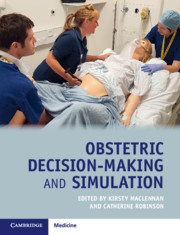Book contents
- Obstetric Decision-Making and Simulation
- Obstetric Decision-Making and Simulation
- Copyright page
- Contents
- Contributors
- Foreword
- Part 1 The Role of Simulation
- 1 Setting the Scene for Simulation-Based Education
- 2 The Where of Simulation Training
- 3 Interprofessional In Situ Simulation
- 4 Debriefing and the Debrief
- 5 Fidelity in Obstetric Simulation
- Part 2 The Impact of Human Factors in Clinical Practice
- Part 3 Clinical Scenarios
- Scenario Section 1 Obstetric
- Scenario Section 2 Maternal Collapse
- Scenario Section 3 Hypertensive Disorders of Pregnancy
- Scenario Section 4 Neuraxial Analgesia
- Scenario Section 5 Non-Neuraxial Analgesia
- Scenario Section 6 General Anaesthesia
- Scenario Section 7 Haemorrhage
- Scenario Section 8 Sepsis
- Scenario Section 9 Cardiac
- Scenario Section 10 Endocrine
- Scenario Section 11 Neurological
- Scenario Section 12 Trauma
- Scenario Section 13 Neonatal
- Index
- References
4 - Debriefing and the Debrief
from Part 1 - The Role of Simulation
Published online by Cambridge University Press: 25 March 2019
- Obstetric Decision-Making and Simulation
- Obstetric Decision-Making and Simulation
- Copyright page
- Contents
- Contributors
- Foreword
- Part 1 The Role of Simulation
- 1 Setting the Scene for Simulation-Based Education
- 2 The Where of Simulation Training
- 3 Interprofessional In Situ Simulation
- 4 Debriefing and the Debrief
- 5 Fidelity in Obstetric Simulation
- Part 2 The Impact of Human Factors in Clinical Practice
- Part 3 Clinical Scenarios
- Scenario Section 1 Obstetric
- Scenario Section 2 Maternal Collapse
- Scenario Section 3 Hypertensive Disorders of Pregnancy
- Scenario Section 4 Neuraxial Analgesia
- Scenario Section 5 Non-Neuraxial Analgesia
- Scenario Section 6 General Anaesthesia
- Scenario Section 7 Haemorrhage
- Scenario Section 8 Sepsis
- Scenario Section 9 Cardiac
- Scenario Section 10 Endocrine
- Scenario Section 11 Neurological
- Scenario Section 12 Trauma
- Scenario Section 13 Neonatal
- Index
- References
Summary

- Type
- Chapter
- Information
- Obstetric Decision-Making and Simulation , pp. 22 - 28Publisher: Cambridge University PressPrint publication year: 2019



